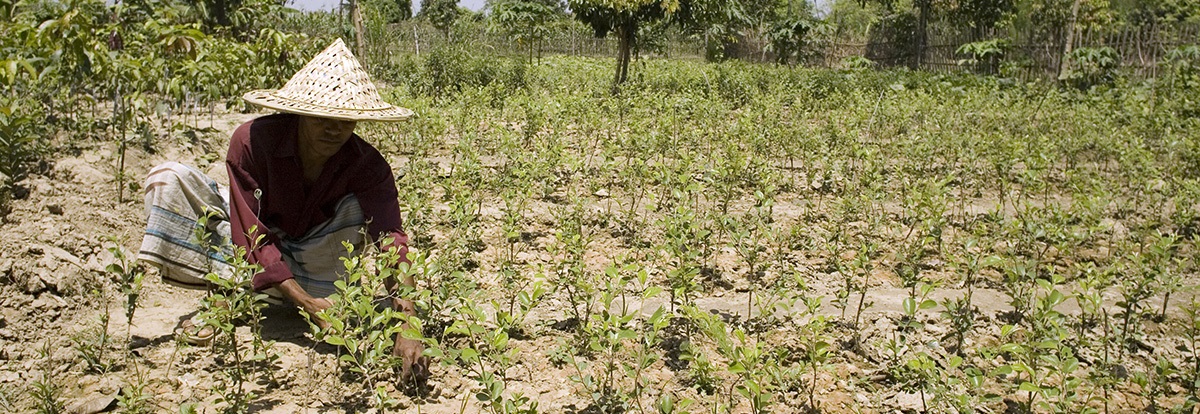Vision and mission

Vision: a world whose food systems are secure and resilient to increasing water scarcity in a changing climate.
Mission: to support measurable, significant and sustainable progress on improving and adapting agricultural systems in conditions of increasing water scarcity and a changing climate, using the combined expertise and resources of the partners.
Objectives: to urgently address the following important and relevant work areas at international and country levels:
- advocating for political prioritization;
- cooperating on work programmes;
- sharing and disseminating knowledge and experience;
- developing new or improved solutions;
- promoting sustainable and integrated water resources management;
- building capacity of partners, countries and other stakeholders; and
- contributing to consistent monitoring systems.
WASAG timeline
The story of WASAG
Water scarcity and water stress, exacerbated by climate change, create one of the larger challenges of the twenty-first century, especially for agriculture and food systems, contributing to crop failures in different parts of the world and to an acute food insecurity crisis in vulnerable countries. Moreover, changing rainfall patterns and the resulting droughts and floods, increasing water pollution and deteriorating water quality, and a warming climate increasingly put food security, water security and livelihoods at risk worldwide.
In response to these challenges, the Global Framework on Water Scarcity in Agriculture (WASAG) was officially launched on the margins of the Twenty‑Second Conference of the Parties (COP22) to the United Nations Framework Convention on Climate Change (UNFCCC) in November 2016 in Marrakech, Morocco and endorsed afterwards by 83 agriculture ministers in January 2017 during the Ninth Berlin Agriculture Ministers’ Conference at the Global Forum for Food and Agriculture (GFFA).
Subsequently, more than 100 entities, including state actors and other intergovernmental organizations, United Nations (UN) agencies and other UN bodies, academia and research institutions, universities, civil society organizations, private sector organizations and professional trade associations responded to the call of the Food and Agriculture Organization of the United Nations (FAO) to join a global framework for action to catalyze international cooperation on water scarcity in agriculture. This first meeting of partners resulted in the establishment of a partnership initiative with the same name, the Global Framework on Water Scarcity in Agriculture, hosted by FAO, and the adoption of the Rome Statement on Water Scarcity in Agriculture.
The primary objective of WASAG is to support countries and stakeholders to adapt to the effects of water scarcity in agriculture in a changing climate. Furthermore, WASAG supports countries in their commitments and plans related to the 2030 Sustainable Development Agenda, and in particular, Sustainable Development Goal (SDG) 6: Clean water and Sanitation and SDG 2: Zero Hunger, but also including SDG 1: No Poverty, SDG 3: Good Health and Well‑being, SDG 5: Gender Equality, SDG 12: Responsible Consumption and Production, SDG 13: Climate Action, SDG 15: Life on Land, and SDG 17: Partnerships for the Goals.
As a fast‑growing network with more than 75 partners, WASAG has quickly gained momentum as a collaborative platform for tackling water scarcity in agriculture in its multiple facets, such as drought preparedness, financing mechanisms, saline agriculture, sustainable agricultural water use, water and migration, and water and nutrition.
Soon after its establishment, WASAG was supported by the Committee on Agriculture (COAG) in its twenty‑sixth session of October 2018 as a key coordination mechanism to adapt to the effects of water scarcity in agriculture in a changing climate. It was also requested that WASAG report to COAG periodically on the progress of the partnership.
Under the leadership of a Steering Committee constituted of representatives of the different groups of partners, and with the support and support of Cabo Verde and Switzerland, WASAG organized two international forums (March 2019 and February 2023) which demonstrated how the political will of Members and the resolve of partners could facilitate collaboration towards the required solutions.
Since 2021, the Netherlands hosted events promoting saline agriculture at different Conferences of Parties (COP) in collaboration with WASAG and partners. WASAG partners also organized several events, including over 10 webinars during the COVID-19 pandemic, as well as other technical and high-level sessions. Notably, WASAG participated in the UN Water Conference of March 2023 and is one of FAO's Commitments.
The evidence of increasing water scarcity compelled the Second International Forum to make specific recommendations for a more appropriate response, as reflected in the Praia Call for Action, leading to the High‑Level Rome Water Dialogue on WASAG which took place in Rome on 17 October 2024 during the World Food Forum.
During the high‑level dialogue, heads of delegation, ministers and partners of WASAG expressed their intention to translate their policy commitments into policy approaches, plans and actions by committing to the following (among others):
- confirming that WASAG is available for partnership, with all FAO Member Nations to engage in and collaborate on identified priorities and solutions to address water scarcity in agriculture;
- establishing a FAO Member-led Steering Committee to play a strategic oversight and direction role and to mobilize the required commitments for WASAG; and
- establishing a Technical Advisory Committee, representing the different groups of WASAG partners to provide technical and scientific expertise to support the WASAG Steering Committee and WASAG working groups for the effective implementation of the WASAG work programme.
These commitments are reflected in the Rome Declaration on Water Scarcity in Agriculture, which now guides the work of WASAG.
